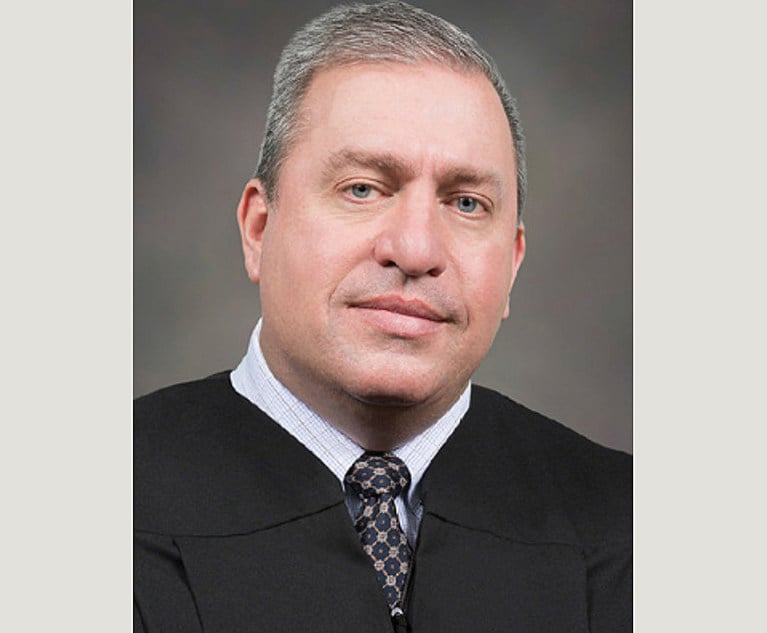 Credit: danielfela/Shutterstock.com
Credit: danielfela/Shutterstock.comFamily Members Who Did Not Live With Insured Lose Bid for UIM Benefits
A federal district court in Pennsylvania has ruled that an insurance company did not owe coverage to a couple injured in an auto accident under a policy issued to the husband's father where the couple did not reside with his parents.
April 11, 2019 at 08:39 AM
4 minute read
The original version of this story was published on Law.com
This story is reprinted with permission from the Insurance Coverage Law Center, the industry's only comprehensive digital resource designed for insurance coverage law professionals. Visit the website to subscribe.
A federal district court in Pennsylvania has ruled that an insurance company did not owe coverage to a couple injured in an auto accident under a policy issued to the husband's father where the couple did not reside with his parents.
|The Case
Adam McGeehan and his wife Laura McGeehan alleged that they were traveling in a Chevy Trailblazer when they were struck by a vehicle operated by William Schick. Schick's insurance carrier paid the liability limits of his policy for bodily injury.
At the time, Adam McGeehan's father, Paul McGeehan, held an insurance policy issued by First Liberty Insurance Corp. on a Lincoln Navigator that provided underinsured motorist (UIM) coverage with a liability limit of $300,000 per accident and an endorsement that allowed stacking of UIM benefits. First Liberty rejected Adam and Laura McGeehan's claim for “family member” coverage under this policy.
First Liberty maintained that a “family member” was covered under the policy only if the family member was a resident of Paul and Roseann McGeehan's household at the time of the accident, and that Adam and Laura McGeehan were not residents of that household.
First Liberty filed a declaratory judgment action seeking a determination of its rights and responsibilities under its insurance policy. First Liberty moved for summary judgment.
First Liberty asserted that a “family member” had to be both (a) a person who was related to the insured by blood, marriage, or adoption, and (b) a resident of the insured's household.
The McGeehans argued that the definition of “family member” was ambiguous and it could be read to mean that “blood” relatives and those related by “marriage” automatically qualified as “family members” but that those related by adoption were covered only if they also were residents of the household.
|The First Liberty Policy
The First Liberty insurance policy provided:
“'Family member' means a person related to [the insured] by blood, marriage or adoption who is a resident of [the insured's] household. This includes a ward or foster child.”
|The District Court's Decision
The court granted the motion.
In its decision, the court found that the “clear and unambiguous meaning” of the policy language was that all categories of “family members” had to be residents of the insured's household.
It then decided that, as a matter of law, Adam and Laura McGeehan were not “residents” of Paul and Roseanne McGeehan's household at the time of the accident. The court found insufficient evidence in the record to support an inference that Adam and Laura McGeehan had established residency in his parents' home following their marriage.
The case is First Liberty Insurance v. McGeehan.
Edward A. Schenck of Cipriani & Werner in Pittsburgh represented First Liberty Insurance.
Alexander K. Cox and Bryan G Baumann of Knox McLaughlin Gornall & Sennett in Erie represented Paul and Roseann McGeehan and Adam and Laura McGeehan.
Steven A. Meyerowitz, a Harvard Law School graduate, is the founder and president of Meyerowitz Communications Inc., a law firm marketing communications consulting company. Meyerowitz is the director of the Insurance Coverage Law Center and editor-in-chief of journals on insurance law, banking law, bankruptcy law, energy law, government contracting law, and privacy and cybersecurity law, among other subjects. He can be contacted at [email protected].
This content has been archived. It is available through our partners, LexisNexis® and Bloomberg Law.
To view this content, please continue to their sites.
Not a Lexis Subscriber?
Subscribe Now
Not a Bloomberg Law Subscriber?
Subscribe Now
NOT FOR REPRINT
© 2024 ALM Global, LLC, All Rights Reserved. Request academic re-use from www.copyright.com. All other uses, submit a request to [email protected]. For more information visit Asset & Logo Licensing.
You Might Like
View All
Pa. High Court to Weigh Parent Company's Liability for Dissolved Subsidiary's Conduct
3 minute read
Pa. Supreme Court Taps New Philadelphia Family Division Administrative Judge
3 minute read
People in the News—Nov. 27, 2024—Flaster Greenberg, Tucker Arensberg
3 minute read
Trending Stories
Who Got The Work
Michael G. Bongiorno, Andrew Scott Dulberg and Elizabeth E. Driscoll from Wilmer Cutler Pickering Hale and Dorr have stepped in to represent Symbotic Inc., an A.I.-enabled technology platform that focuses on increasing supply chain efficiency, and other defendants in a pending shareholder derivative lawsuit. The case, filed Oct. 2 in Massachusetts District Court by the Brown Law Firm on behalf of Stephen Austen, accuses certain officers and directors of misleading investors in regard to Symbotic's potential for margin growth by failing to disclose that the company was not equipped to timely deploy its systems or manage expenses through project delays. The case, assigned to U.S. District Judge Nathaniel M. Gorton, is 1:24-cv-12522, Austen v. Cohen et al.
Who Got The Work
Edmund Polubinski and Marie Killmond of Davis Polk & Wardwell have entered appearances for data platform software development company MongoDB and other defendants in a pending shareholder derivative lawsuit. The action, filed Oct. 7 in New York Southern District Court by the Brown Law Firm, accuses the company's directors and/or officers of falsely expressing confidence in the company’s restructuring of its sales incentive plan and downplaying the severity of decreases in its upfront commitments. The case is 1:24-cv-07594, Roy v. Ittycheria et al.
Who Got The Work
Amy O. Bruchs and Kurt F. Ellison of Michael Best & Friedrich have entered appearances for Epic Systems Corp. in a pending employment discrimination lawsuit. The suit was filed Sept. 7 in Wisconsin Western District Court by Levine Eisberner LLC and Siri & Glimstad on behalf of a project manager who claims that he was wrongfully terminated after applying for a religious exemption to the defendant's COVID-19 vaccine mandate. The case, assigned to U.S. Magistrate Judge Anita Marie Boor, is 3:24-cv-00630, Secker, Nathan v. Epic Systems Corporation.
Who Got The Work
David X. Sullivan, Thomas J. Finn and Gregory A. Hall from McCarter & English have entered appearances for Sunrun Installation Services in a pending civil rights lawsuit. The complaint was filed Sept. 4 in Connecticut District Court by attorney Robert M. Berke on behalf of former employee George Edward Steins, who was arrested and charged with employing an unregistered home improvement salesperson. The complaint alleges that had Sunrun informed the Connecticut Department of Consumer Protection that the plaintiff's employment had ended in 2017 and that he no longer held Sunrun's home improvement contractor license, he would not have been hit with charges, which were dismissed in May 2024. The case, assigned to U.S. District Judge Jeffrey A. Meyer, is 3:24-cv-01423, Steins v. Sunrun, Inc. et al.
Who Got The Work
Greenberg Traurig shareholder Joshua L. Raskin has entered an appearance for boohoo.com UK Ltd. in a pending patent infringement lawsuit. The suit, filed Sept. 3 in Texas Eastern District Court by Rozier Hardt McDonough on behalf of Alto Dynamics, asserts five patents related to an online shopping platform. The case, assigned to U.S. District Judge Rodney Gilstrap, is 2:24-cv-00719, Alto Dynamics, LLC v. boohoo.com UK Limited.
Featured Firms
Law Offices of Gary Martin Hays & Associates, P.C.
(470) 294-1674
Law Offices of Mark E. Salomone
(857) 444-6468
Smith & Hassler
(713) 739-1250





